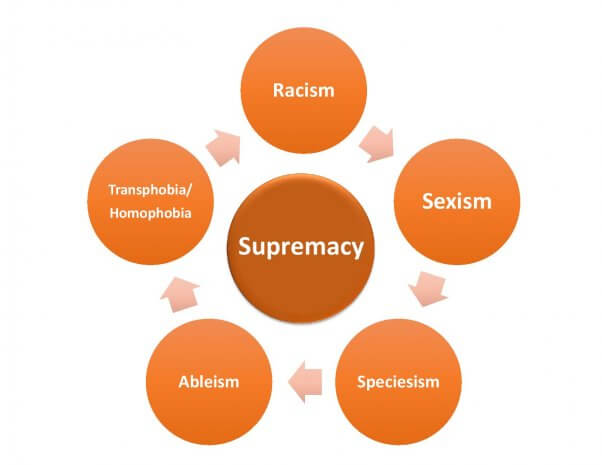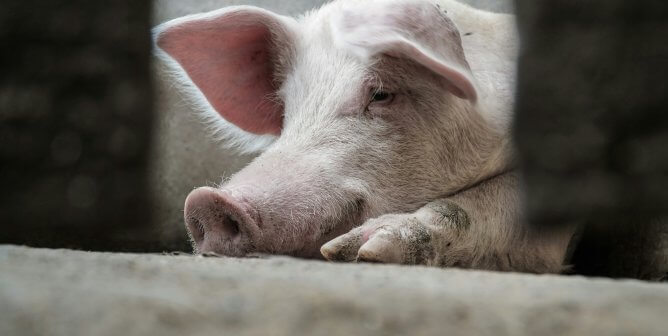If You Care About Social Justice, You Should Fight Speciesism
Ageism, racism, misogyny, homophobia, and ableism should be as glaringly obvious as oncoming headlights in the dark by now. But what about “speciesism“? What is it, and what can we do to stop it?
In the same way that other ugly “isms” result in discrimination against other humans based on arbitrary factors like the color of their skin, their gender, their sexual orientation, or their physical capabilities, speciesism ascribes an inferior status to those who don’t happen to be human. It defines “animals” (other than humans) as little more than research tools, food, fabric, or toys—objects to satisfy human whims—just because they’re not members of our species. Simply put, speciesism is a bias in favor of the human race over other animal races, just as one particular set of humans may be biased against another. It is the misguided belief that one species is more important than another.
But other animals are not objects that belong to us—they’re individuals with their own interests, just like humans. They are not “nonhumans” any more than you and I are non-chipmunks. Addressing our bias against other species does not require that we give equal or identical treatment—chipmunks don’t want the right to vote, for example. It requires that we show equal consideration for others’ interests. We must recognize that we are all living beings with thoughts, feelings, and desires, and we should all be spared the whip, the shackle, the knife, and a life of servitude.
But when we’re still tackling the oppression of humans, is it a luxury to be concerned about other animals?
Bullying and violence aren’t limited to humans any more than they’re limited to certain races or one gender identity. If we want a more just world, we must work to end all prejudice, not just the kinds that affect us personally.
The mindset that condones the oppression of humans—whether we’re talking about Muslims, women, older people, members of the LBGTQ community, or people of color—is the same mindset that permits the exploitation of animals. Prejudices arise when we start to believe that “I” am special and “you” are not and that “my” interests somehow trump those of other living beings.
Philosopher Peter Singer, who drew attention to the concepts of speciesism and animal rights in his groundbreaking book Animal Liberation, puts it this way:
I don’t see any problem in opposing both racism and speciesism, indeed, to me the greater intellectual difficulty lies in trying to reject one form of prejudice and oppression while accepting and even practicing the other.
In many cases, those who are working to break down the prejudices that cause animals to be treated as “less than” are the same people who advocate for LGBTQ rights, disability rights, racial justice, religious tolerance, and other social justice issues.
Bigotry in all its ugly forms is wrong—regardless who the victim is. And when we witness it, we shouldn’t let it go unchallenged.
There is no such thing as a single-issue struggle, because we do not live single-issue lives.
—Audre Lorde, civil rights activist and feminist
So how can we challenge speciesism in our own lives?
Addressing speciesism and acknowledging other animals’ rights can be as simple as respecting their needs. We must recognize that they have their own interests and deserve to live free from pain and suffering—while also facing up to the prejudices which allow us to turn a blind eye to the horrors inflicted on them every single day inside laboratories, slaughterhouses, and circuses. No matter how different we may look from each other, we’re all in this together. Once we come to this realization, it’s our responsibility to do something about it.
All of us, regardless of any differentiating characteristics, deserve consideration, respect, and kind treatment. Here are three easy ways you can help stop speciesism today:
- Support cruelty-free companies. Hundreds of thousands of animals are poisoned, blinded, and killed every year in archaic tests for cosmetics, personal-care products, and household cleaning products. PETA’s searchable database includes thousands of companies that don’t test on animals, so no matter what you’re looking for, it’s easy to find an animal-friendly option.
- Eat vegan. Eating meat means paying someone to draw a knife across an animal’s throat. Eating cheese, yogurt, and other dairy “products” means stealing the milk meant for a baby. And eating eggs means condemning hens to a lifetime of misery in a small wire cage. Pledge to go vegan.
- Shed your skins. There’s no reason to kill animals for fashion. Sustainable vegan options—such as faux leather made from pineapple leaves and grapes, “wool” made from hemp and bamboo blends, and down alternatives made from plant sugars and eucalyptus—are on the rise, and more are being developed all the time. Find out more about wearing vegan.
Visit PETA’s Action Center for more ways to take a stand against animal exploitation.
Wear this bold tee to remind folks that there’s no place and no excuse for speciesism, homophobia, xenophobia, racism, or sexism.





